
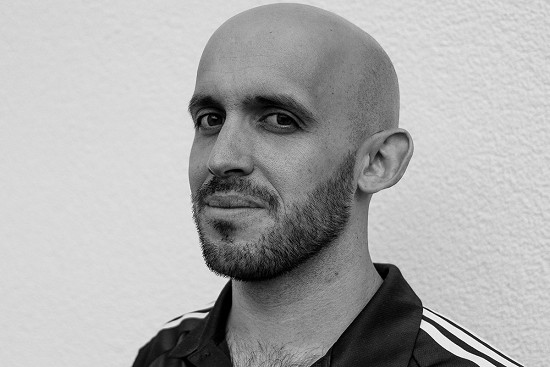
I used to be a good climber, not elite-level, but I did some World Cups 15 years ago, finishing in the top 20 sometimes. Eight years ago, I started working for the French federation, with the youth teams. Since 2012 I am the coach of the French bouldering team. I am also a coach at the "Pôle France", which is where most French athletes train. I tell them what training to do when, how to plan each cycle. I make the plan for the year and also for the years coming. This is what I have been doing up until now, it will certainly evolve in the future.
You are also a very good climber. For example, you became third at the French Nationals in 2014. How do you balance your work and your own climbing?
In the last 4 or 5 years, I have not climbed much outside my work. But we set boulders almost every day at the Pôle France, so I still get to climb in that context. I do not follow a precise training plan. However, I think that if I got back into competitions now, at age 34, given how much experience I have gained, I could do much better than before. There were many things I did not really understand regarding training and approaching a competition. Experience really plays a role there.
How important is it for a coach to climb or have competed at an elite level?
You don't necessarily need a huge amount of experience as a coach, however I think that it is important to always reflect on what climbing is today and what it will be tomorrow. To foresee the evolution. The last two or three years, and in particular this year, a lot of things have evolved. I think that I have a good idea of what it will be like in two or three years. You always have to think about what it takes to be prepared for tomorrow. We have missed that a bit this year. That is why our results have been worse than in 2016 so far. We didn't manage to anticipate and prepare well enough.
What do you think will be the future?
I think that ten years ago, the style was very physical. Then things changed towards very technical, low-percentage problems with a lot of volumes. I think that the future are boulders that are both extremely physical and low-percentage. It will for sure require an even higher climbing level, where your coordination must be perfect and you will be climbing on extremely small holds all at the same time.
Can you describe your training philosophy?
I try to make the climbers aware of their responsibilities and make sure they are self-motivated, that they know, at least on an emotional level, what they want and why they train. I really want the training to be their project and not mine. Once you achieved that, everything becomes possible.
At the Pôle France, we have a leitmotiv: "Pas de barrières." In French, that means that you do not set yourself a limit. We all have a system of reference based on which we tell ourselves "this is the maximum I can reach". Once we liberate ourselves of these self-imposed limits, we can all go much further than we ever imagined.
How does this affect your training on a daily basis?
Let's say that comes into effect by what we impose during the training. And then the speeches that we give to the athletes, the attitude we want them to have. At the Pôle France, for many years, we have had two ways: One was taken by those who did very nice results, compared to their potential. They might not have become World Champions, but they fulfilled their potential. And then there are those that quit. There really is no middle way, you can't be mediocre because it won't work. You either succeed or you quit. We pretty much only had these two cases, in fact.
You must have had some gifted athletes who quit early?
Yes. Maybe in another way of doing it, some athletes could have done more, I don't know. With our way, you can only make a certain type of personality emerge and achieve their best. The people that were very self-determined in regards to what they wanted to achieve.
Let's talk about Innsbruck 2018. What do you think about the new training centre in Innsbruck?
The facility is extraordinary. It is the most beautiful gym I have seen so far. In terms of lead climbing, it is by far the best I have ever seen. The bouldering area is great without being exceptional.
Do you think it will make a big difference for the Austrian team?
The World Championships are coming up in a year, so it is difficult to say how big the difference will be on such short notice. For the youngsters who train here every day, it will really change things in the next 3, 4 or 10 years. This is an exceptional tool and I think it will remain that way for many years to come. It is very impressive.
Your team had the World Championships at home two years ago. How was that? Did you have more pressure than usually?
We focused on the positive aspects from the start, saying that this was an advantage for us. We told ourselves: we have the crowd and everything happens near our home. Usually it takes us hours to get to the venue, there, we were taking the subway for 30 min. It always helps to compete in a place that you know well. It was indeed an advantage, the team, in particular the boys, did very well. Of course, there are requests that don't come up when the event is in another country. There were athletes who felt extra pressure and for whom it was harder than normal. You have to think it through beforehand and know that there will be elements that you aren't used to. If you manage to focus on the positive it is inevitably going to be an advantage to have the World Championships at home.
Do you prepare the same way for 2018 than you did for 2016?
No. It will certainly be different because it is at a different venue. Once we know what the wall will look like, who the routesetters will be and what climbing hold brands will sponsor the event, we know the parameters that inform our preparation. Within the French team, some organisational aspects, training locations and so on will also change. Nonetheless, what will remain the same is that the best boulderers in France will prepare as well as possible for the event, even if some might train to qualify for the Olympic games on the side.
What would be your advice for the Austrian team?
This opportunity won't come again soon, so it is crucial to focus on the positive. We realised that we spent a long time getting ready, but then it went by really fast. You have to enjoy it, and not put yourself under pressure. Don't think I have to make finals, this or that result. Just enjoy every round and stay positive.
The Olympic combined format will be part of Innsbruck 2018. What do you think about this format, does it make sense?
I don't know if it makes sense. In any case, we didn't have a choice and so when the committee said it must be a combined format, we came up with one. I think for a combined, it's not bad, multiplying the rankings is a great asset for the specialists in each discipline. The best boulderers and the best lead climbers will certainly be present. We will see how it turns out, but I can imagine the Olympic finals to become something very nice.
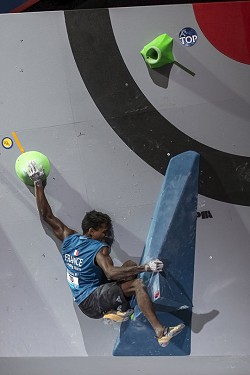
The organisation is coming together at the moment. Some people have started, yes. Most importantly Manuel Cornu who became second in the combined ranking in Paris last year, and Mickael Mawem.
He did some speed climbing, right?
Yes, he has been doing that for a while. He became French champion a few years ago (not on the World Record route). Cornu and Mawem have their strengths in speed climbing. Most boulderers will be quite strong speed climbers if they want to. I think that after the European Championships, this will really take off.
So it's the boulderers that are suited best for venturing into the combined discipline, or is it individual?
I think it is quite individual, but I have the impression that boulderers have the most "central" skills. The speed climbers have a very different body type, and very specialised lead climbers will have a difficult time adapting to bouldering.
There are some climbers like Jakob Schubert, Adam Ondra and Jan Hojer, who will be very good. The Japanese will be extremely strong, because they have a good build for lead and have great maximum power, which is great for speed. I don't think anyone will be perfect in three disciplines, but you'll have to be excellent at two.
What are the most important ingredients that an athlete needs to be successful at the Bouldering World Cups?
I think that for a young athlete, the key is to be physically very strong, because later in life it becomes increasingly difficult to improve in that aspect. The second thing is to be very flexible. You can improve your technique for a long time.
In Vail and in Mumbai, there were no French athletes. How does the selection work?
There are two elements. One, we have a budget for the season, according to which we have to make choices. For the FFME, the overall ranking doesn't count, because the French Sports Ministry doesn't consider this when giving subsidies. The goals are solely the WCH and the ECH. That's why we said that unless you make a podium on one of the first four World Cups, you aren't in the running for the Overall, and thus don't go to Vail and Mumbai. That way they can rest and prepare for the European Championships. Last year, this strategy worked very well for us. I think that those who went to Mumbai will have a harder time to redo their cycles to really train.
You as a coach can't nominate someone just based on your judgement?
No. In fact it's not that I can't, it's that I don't want. We are team- and Pôle France coaches. We would be tempted to nominate someone because we see them every day at the Pôle. This would not be good for the motivation of the athletes that train elsewhere. Leaving my opinion out of the equation gives a fair chance to everyone.
Aren't results in bouldering too volatile to completely rely on competitions when it comes to the team selection?
For the team selection before the season, we already do two competitions to make it less random. Bouldering competitions are very hard and competitive. If you don't manage to be ready on the day of the selection competition, it is because you have to go back to training and prepare better. And frankly, if you are 5th or 6th in France, where the level is good, you won't win World Cups, where all the Japanese compete. If you are strong enough to compete in World Cups, you will qualify for the team no problem. Being strong enough to compete in World Cups involves more than just being strong in training, you need a good head to be at your best on the day of the competition.
It seems to work well.
I don't know if it is good, but it is how I see it.
The results speak for themselves.
We will know once it will be done differently and we see the results.
In France, there is a lot of controversy between coaches, the media, ex-athletes, future ex-athletes... it's all very agitated. Where does that come from? Does it change the way you work?At first, yes. I found it disturbing. In France, this is the way it is in every domain. Our job is to make choices, and we do things the way we think is best. Maybe our way is not the best, and those who will replace us will find another way that might be better or worse. I have my way of seeing things and firmly believe in my way to do things. I try my best and I am quite happy about what I did with my athletes.
In an interview, Mickael Mawem said that "without competition, I wouldn't climb. The only thing that motivates me is the result!" This isn't a standard answer... is this the future?
Yes, that is the future for sure. I will always climb.
My generation came from the outdoors, and then we went to the gym and competed. In Paris, there are about 10 excellent gyms. There are kids who go there every day to climb. These kids will never go outside, they don't know what that is. And it doesn't matter: it is great to be passionate about something, whether it is the competition or the outdoors. Someone like Mickael has a lot of determination to reach his goals. He is not extremely talented, but he works a lot and is very motivated. His dream is to become World Champion, Olympic champion, he thinks about that every day. And he does what it takes. We have been working with him for 2.5 years. Before, he was 50th in France, in 2016, he almost became World Champion. It is impressive.
It must be easier to work with an athlete like him than with a climber who thinks a lot about Madagascar, Fontainebleau or Greenland?
Yes, it is easier. But we had different cases. Like Melissa (Le Nevé), who had a lot of projects aside, and found a good balance that way. She was someone who did everything she wanted to do at 200%. I find that admirable. If you push your limits like that, you are successful. Whether you win or not is not so important, what matters is that you went as far as you could.

This is a tough question, I think there are several factors. There is the group dynamic: they train together and push each other. Tomoa (Narasaki) becoming World Champion certainly removed some barriers. They told themselves: if he can do it, so can we. This is a powerful dynamic.
On a genetic level, they have a very good build for bouldering: they have great maximum power, are rather light and very flexible. Finally, on a cultural level, they have an approach of great rigor and work ethic. It shows in their warm-up routine: they spend an hour doing stretching, while the Europeans put some chalk on their hands and get on the wall.
You think that the key elements are so basic that this dominance won't end any time soon?
I don't think it will reverse, I think it will get worse! (Laughs) Well, worse... it will get harder and harder for us, I mean. Especially among the women, there are a lot of strong Japanese girls that are not yet old enough to participate at the World Cups.
But we should be inspired by this. We, the Europeans, are not rigorous enough, especially when it comes to warming up and stretching. It goes back to the outdoor culture. If you go rock climbing, you won't do stretching for hours, you go climbing. The Japanese have a very indoor-focused approach.
Are you happy about the French team's performance this season?
No, I am definitely not satisfied. Last year, we had a great season finish at the World Championships. Somehow, we didn't manage to transport this into the new season. But, the season isn't over yet! We want to show a great performance in Munich. If we manage that, the season will have been good, otherwise we'll have failed. That's why we are doing a training camp at the moment. I think we'll be well prepared for Munich!
There are not going to be "proper" European Championships in Munich...*
… that's for sure.
If ten Asians end up in semi finals...
... or even in finals! It is possible that the competition is over before it started.
But I don't think that will happen this time. So far, there was always one Japanese among the routesetters, Manu Hassler also has a style that suits them well, very physical on small holds. Given the routesetters in Munich, and the fact that it is them who will have to travel far, I think it will be more balanced.
In other sports, coaches live a nomadic life and change jobs. You are a young and successful coach. Would you consider working elsewhere?
I am a fan of training, and sports in general. I watch a lot of sports World Championships, Olympics, and I am a big soccer fan... For me, going to the Olympics to win medals for France would be a dream come true. But I don't set myself any limits in this regard, you never know what will happen. Maybe we will be solicited. But not anywhere, what matters to me is the project, and the possibility to achieve good results.
To finish, a little word rap:
Coffee or tea? Coffee, way too much.
Steak or tartare? Steak.
Bleau or Rocklands? Bleau!
Overall World Cup winner or World Champion? Olympic Champion.
7 French in semi finals or one on the podium? one on the podium.
The most impressive competitor ever is... Kilian Fischhuber.
The best boulder problem is... (thinks for a long time) Super Prestat, Bas Cuvier.
My favourite moment as a climber was... my first time in Fontainebleau.
More about the World Championships 2018 at Innsbruck Tirol 2018
*at the time of the interview, the ECH was supposed to be fully integrated in the World Cup in Munich.
More about the revised format here

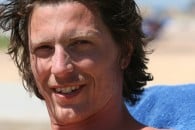

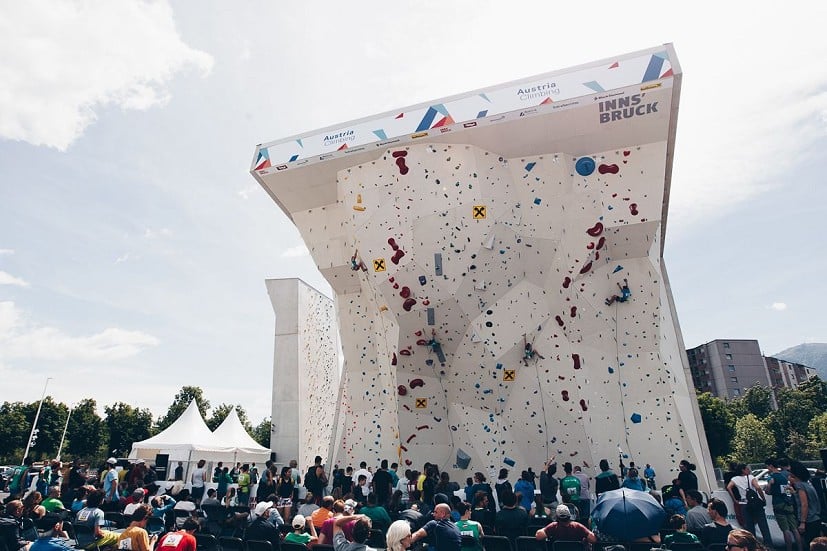
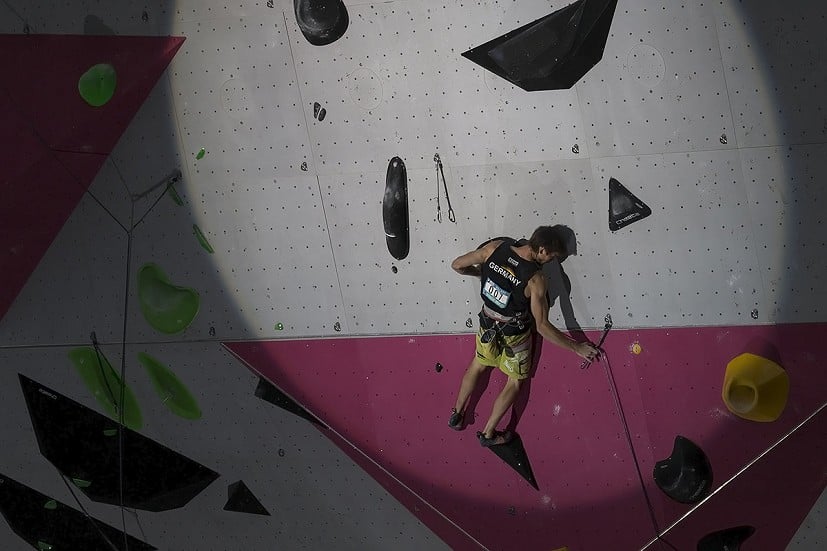
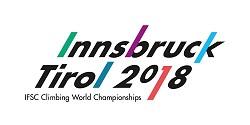


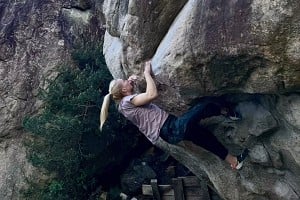
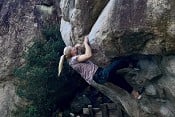


Comments